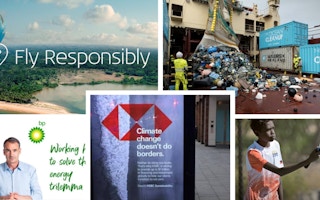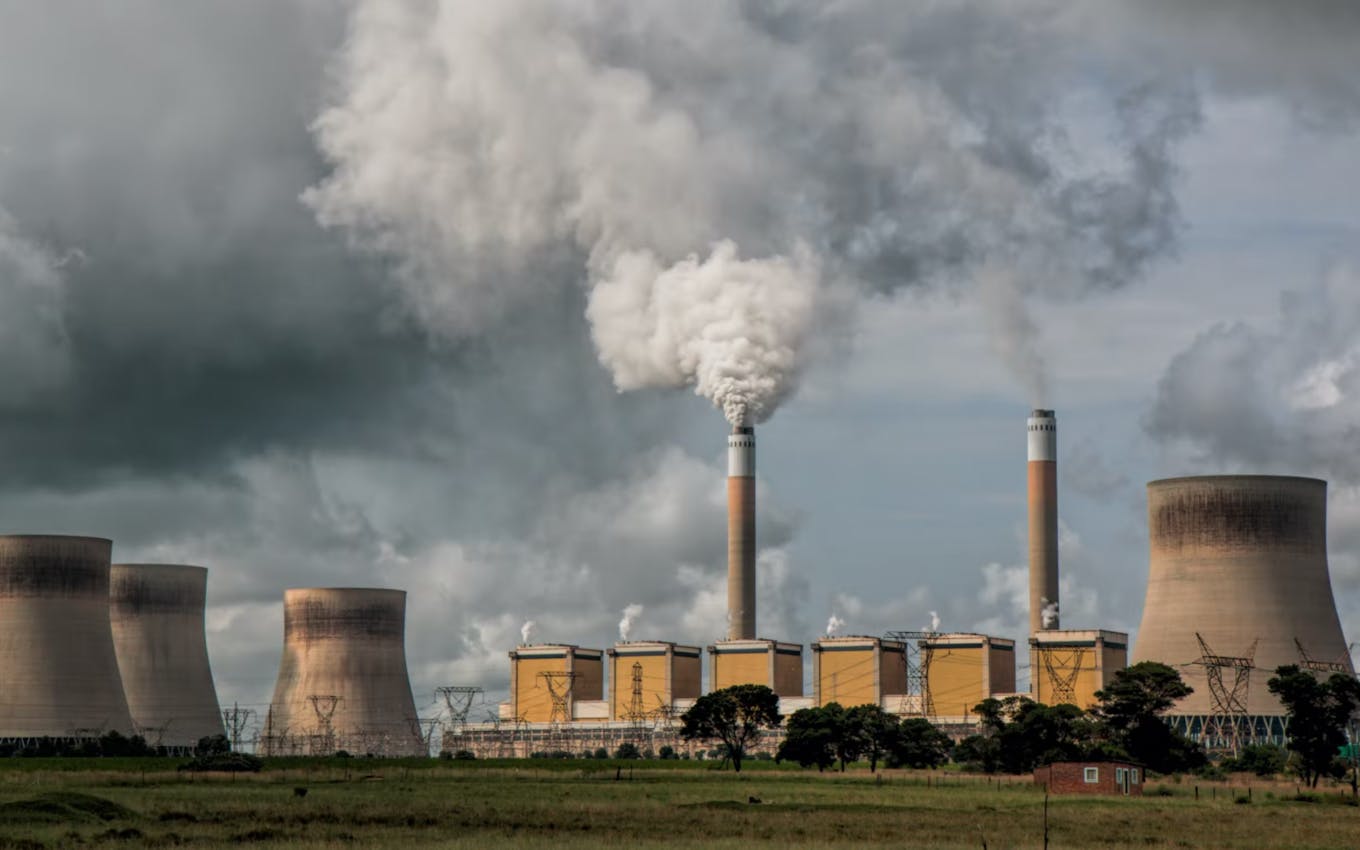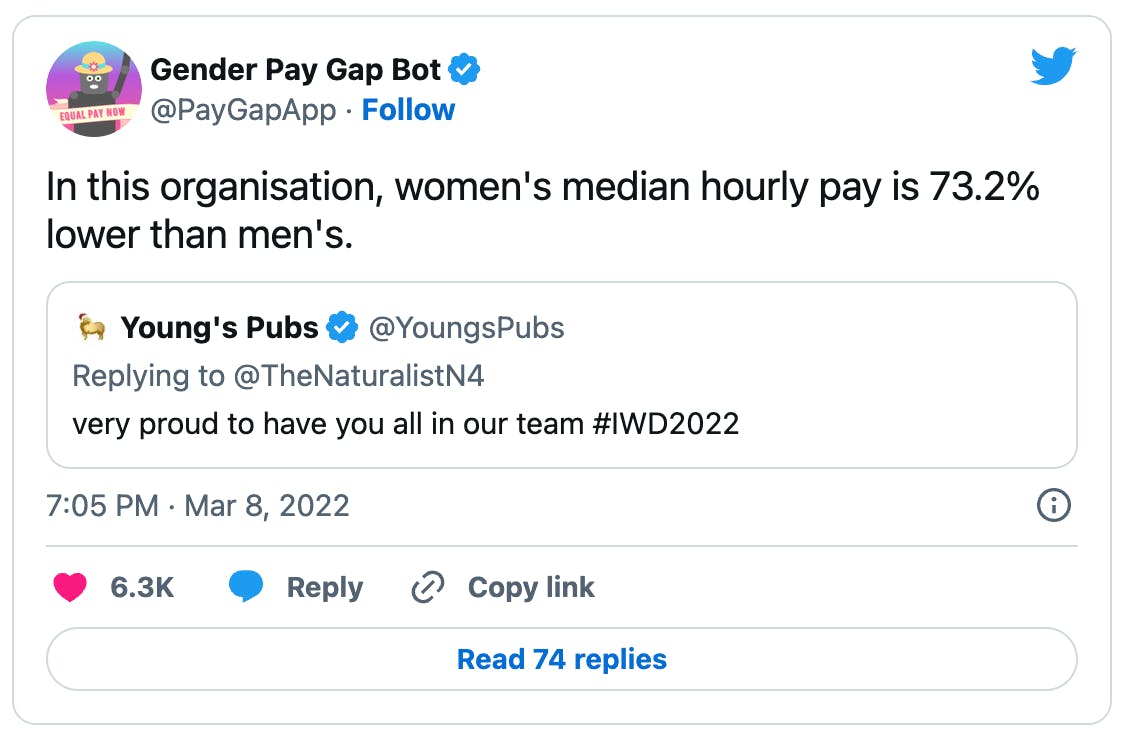2022 was the year that policymakers started to take greenwashing a bit more seriously.
To continue reading, subscribe to Eco‑Business.
There's something for everyone. We offer a range of subscription plans.
- Access our stories and receive our Insights Weekly newsletter with the free EB Member plan.
- Unlock unlimited access to our content and archive with EB Circle.
- Publish your content with EB Premium.
For the first time, companies found themselves in serious legal hot water (see examples below) for exaggerating or falsifying their sustainability credentials, which might explain why some brands have decided to retreat into their shells rather than talk about their sustainability progress this year – a phenomenon known as “green hush”.
Even so, governments, consumers and civic society groups scrutinised green claims more closely than ever this year. In 2020, Eco-Business recorded eight cases of brands called out for greenwashing. In 2021, there were 11. This year, we spotted 18 – and there are doubtless many more examples of green hyperbole finger-pointing that have gone under the radar.
This was also the year that different forms of greenwashing emerged, from labelling plastic products as green on Earth Day to fossil fuels firms “sportswashing” at tennis tournaments. Greenwashing claims also emerged from unexpected sources – environmental groups were lambasted for making suspect claims, particularly in the cowboyish plastic cleanup and recycling space.
Eco-Business shines a light on the times brands, governments and non-profits were accused of making green claims that seemed out of sync with reality.
HSBC: We grow trees (but also coal plants)
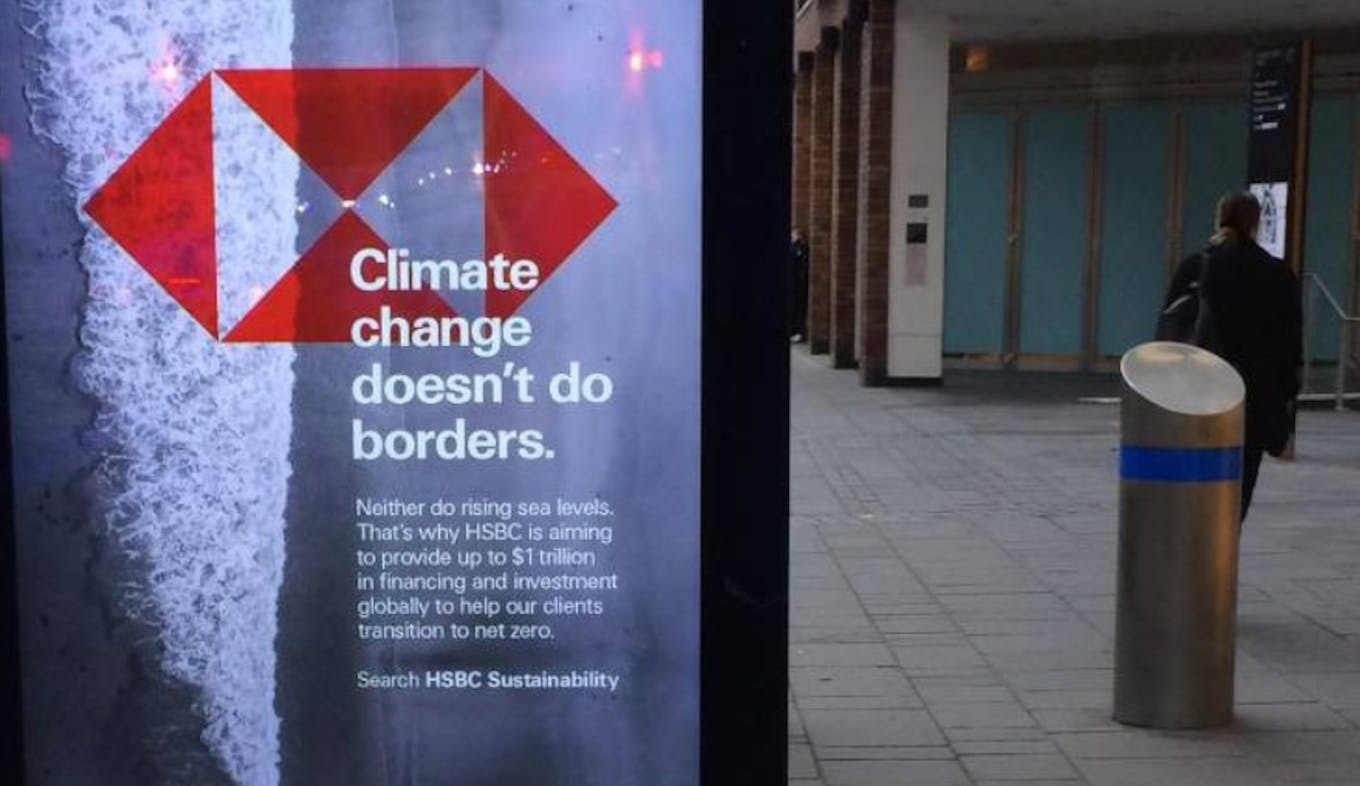
HSBC’s poster ad talked up the bank’s future plans and made no mention of its investments in fossil fuels. Image: Twitter
The world’s biggest consumer bank had an ad campaign pulled down in the United Kingdom after the country’s advertising watchdog ruled that HSBC was touting a tree-planting scheme and its net-zero plan without acknowledging that it finances fossil fuel projects at the same time. The bank has pledged to reduce its thermal coal financing exposure by at least 25 per cent by 2025, but it is still one of the world’s biggest backers of fossil fuel projects. HSBC’s ads “omitted material information and were therefore misleading,” the Advertising Standards Authority ruled. HSBC’s humbling prompted observers to wonder if it would lead to more scrutiny of bank advertising. Banks talk about sustainability more than any other sector, particularly in Asia.
Michelin: Green finance for deforestation
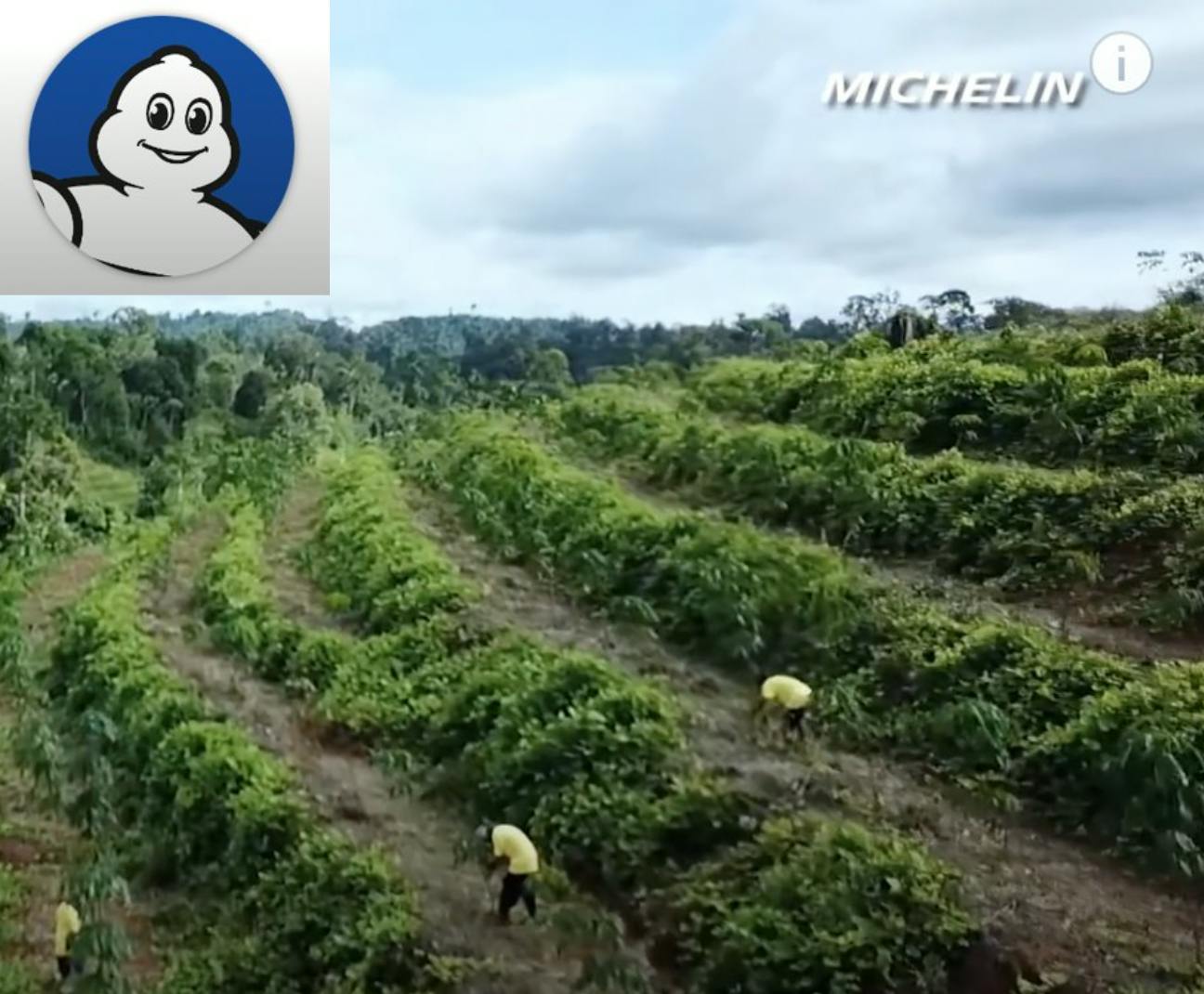
Michelin-star greenwash? The tyre giant’s sustainability commitment was linked to deforestation in Indonesia. Image: Michelin’s commitment to sustainable natural rubber on YouTube
Michelin, the French tyre company also known for its guide to fancy restaurants, made a widely-publicised commitment to plant rubber trees to re-green 90,000 hectares of land trashed by illegal logging in Indonesia in 2015. The project was hailed as the company’s flagship sustainability commitment. But an investigation by non-profit Mighty Earth and Paris-based publication Voxeurop, published in November, found that the project, financed by US$95 million of green bonds, was actually a monoculture natural rubber plantation that replaced thousands of hectares of orangutan, tiger and elephant habitat that had been bulldozed by Royal Lestari Utama, Michelin’s local partner.
Santos: Sportswashing tennis
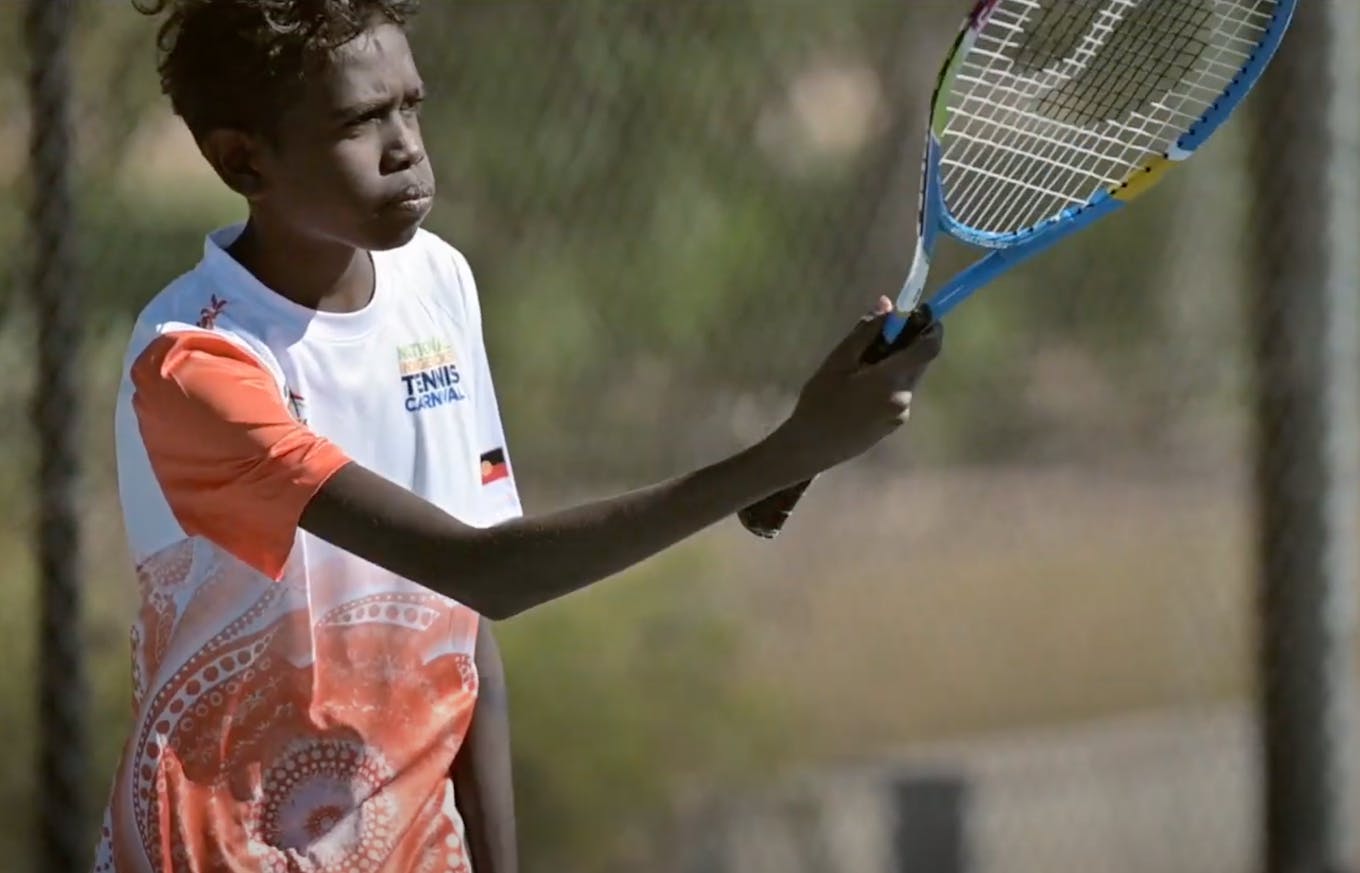
A Santos ad that ran with its sponsorship of Tennis Australia promoted the company’s role as a gas supplier. Santos on YouTube
In a high-profile case of sportswashing – that is, corporations using sport to mask a questionable reputation – Tennis Australia, the sporting body for Australian tennis, ditched oil and gas company Santos as a sponsor in January following a campaign from environmental activists. Santos used Tennis Australia events to promote the jobs provided by the gas industry. “There was a big effort to make it unacceptable for cigarette companies to sponsor events … now it’s the time to do the same for fossil fuel companies,” said Lucy Manne, chief executive officer of 350 Australia, the non-profit that led the campaign against Santos. Tennis is a sport that is particularly affected by climate change. At the 2014 Australian Open, play was suspended and 1,000 spectators were treated for heat exhaustion when temperatures rose above 40 degrees Celsius.
Big Oil: Green claims outweigh green investments
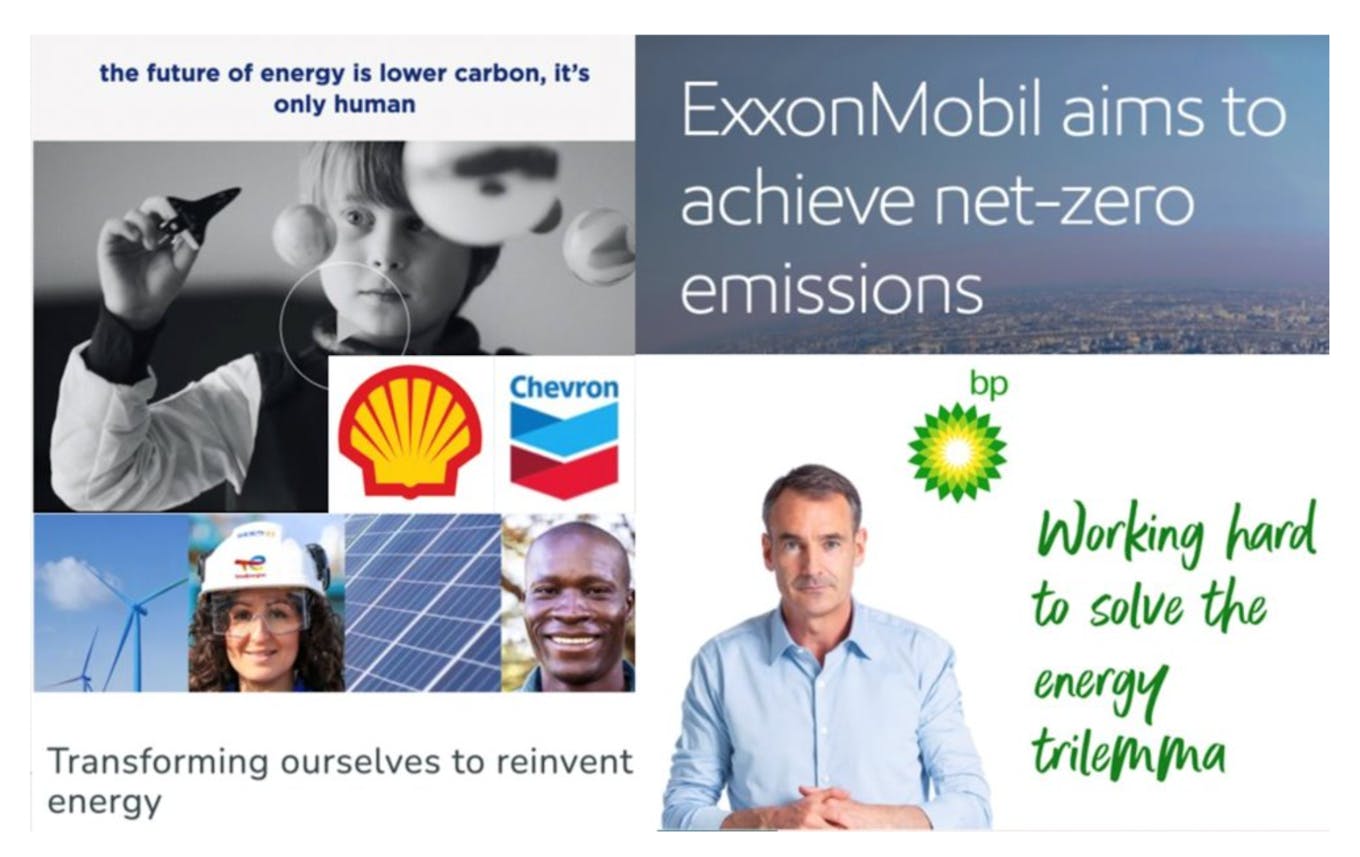
Energy supermajors green claims. Images: shell.com, bp.com, totalenergies.com, exxonmobil.com, chevron.com
Oil and gas firms are often shamed for being prolific greenwashers, and a study by InfluenceMap, a non-profit that monitors corporate lobbying, tried to prove it. It found that six out of every 10 pieces of public communication made by ExxonMobil, Shell, Chevron, BP and TotalEnergies in 2021 positioned these firms as a positive force in tackling climate change – but only 17 per cent of these companies’ investments over the same period went into renewable energy. The study also found that these firms have stripped out fossil fuel from their communications. “The only time BP mentions ‘oil’ in the ‘Who we are’ section of its website is when talking about its history,” said Faye Holder, programme manager for InfluenceMap.
H&M: Fast fiction
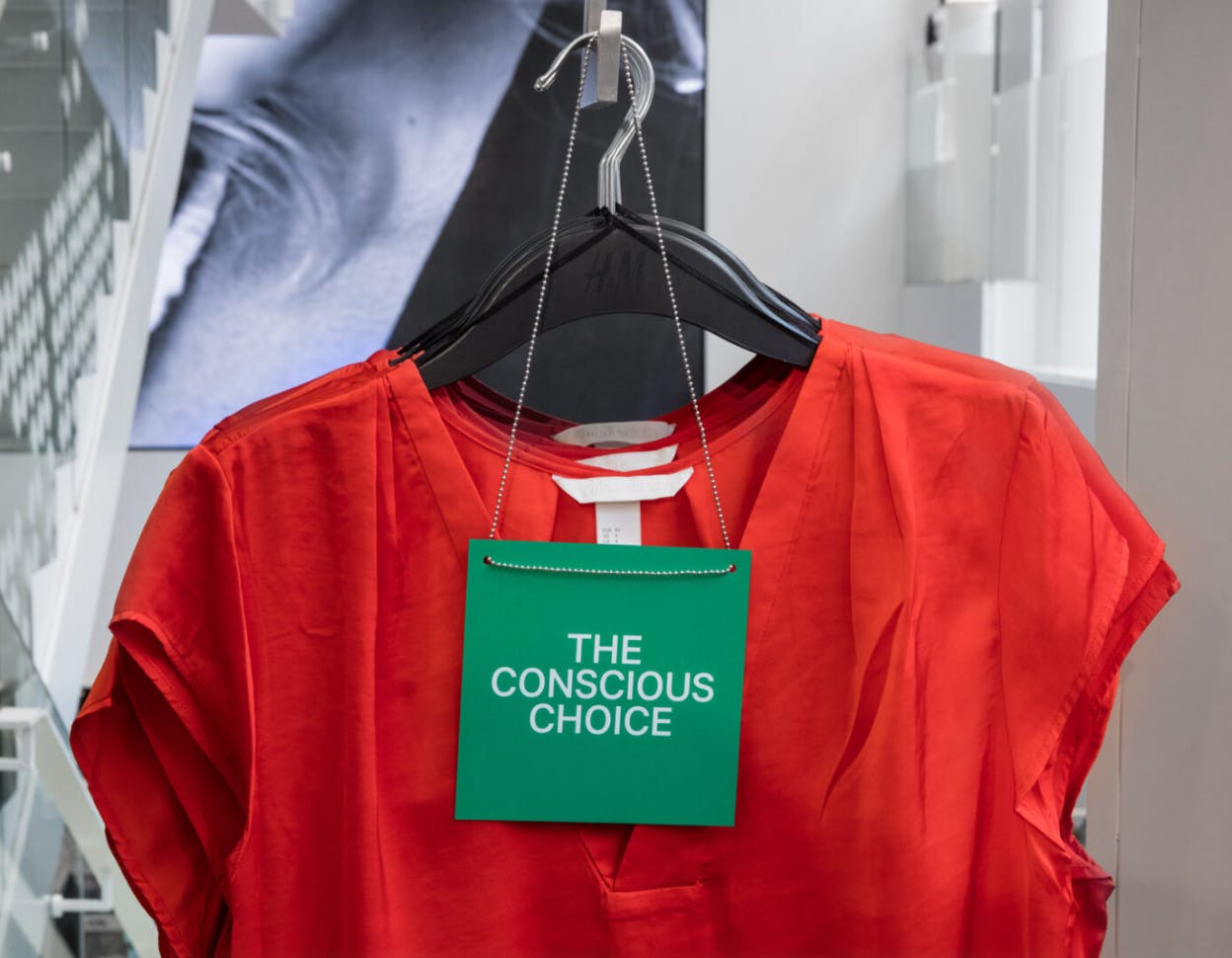
H&M has been sued twice in a year for greenwashing. Image: H&M
H&M was sued in a New York federal court in July for trying to dupe eco-conscious consumers willing to pay more for green products with a clothing range that featured “environmental scorecards” in the labeling, packaging, and marketing. The idea of the scorecards was to inform the consumer how sustainable an item was. But the company ultimately had to scrap the idea after a Dutch regulator ruled that it had used “falsified information that did not comport with the underlying data.” The brand was sued again in November for similarly misleading claims about its “Conscious Choice” collection. Critics said H&M’s cheap-and-fast business model cannot be called “sustainable” no matter how much of its cotton is organic and recycled.
The Ocean Cover-up?
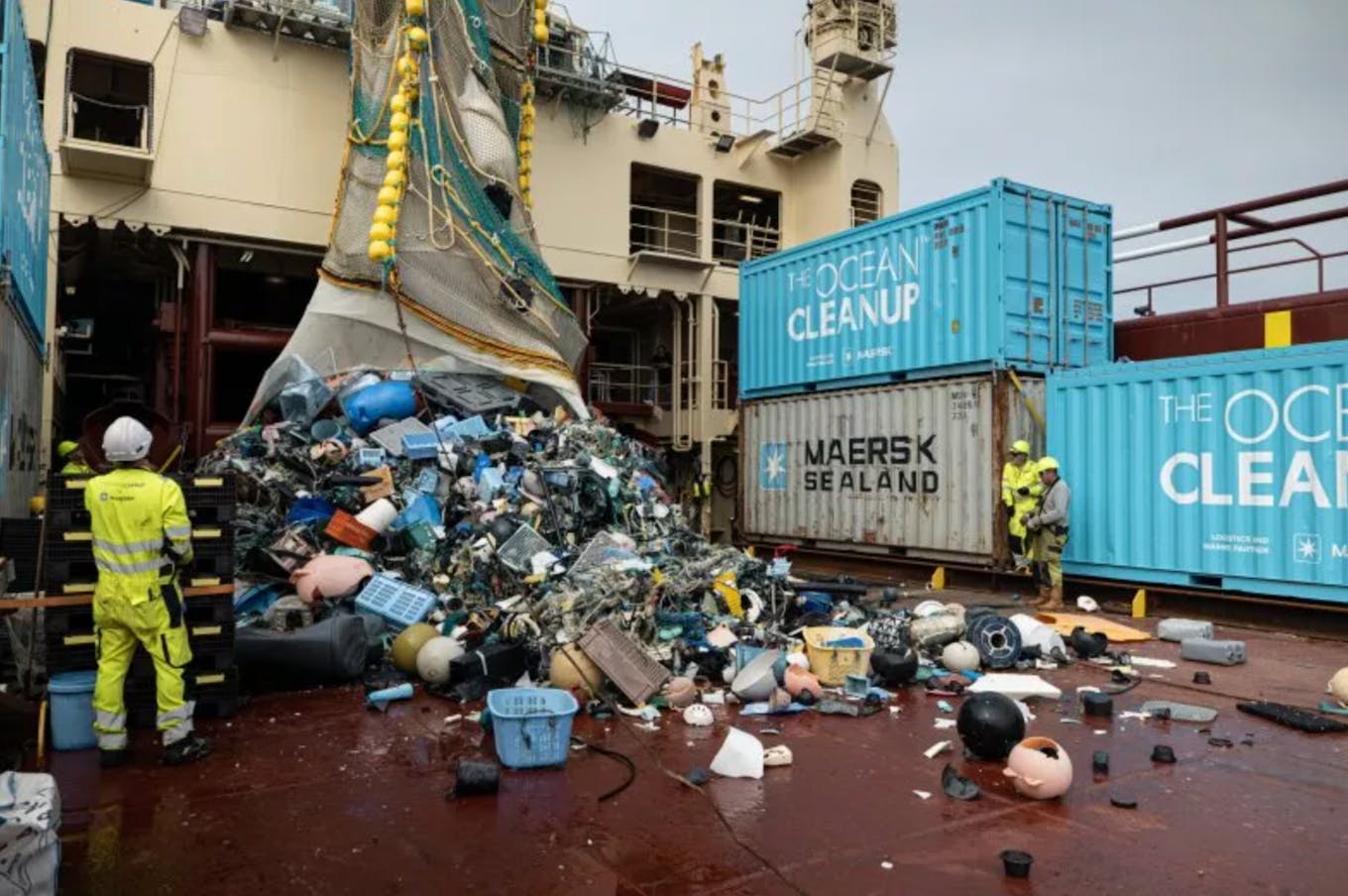
Too clean? Doubters believe the non-profit may have staged an ocean cleanup video to impress funders. Image: The Ocean Cleanup on Twitter
The Ocean Cleanup has been trying to chip away at the Great Pacific Garbage Patch since 2013, when Dutch former aerospace engineering student Boyan Slat announced he was going to tackle marine plastic pollution by scooping it out of the sea in a boat. But in February, Slat was accused of staging a video that showed plastic rubbish being hauled out of the ocean. Doubters, including fishermen and marine biologists, said the retrieved garbage looked suspiciously clean for stuff that had supposedly been bobbing about in the sea for years. Where was the biofoul? Slat said the plastic was almost spotless because that part of the Pacific Ocean is low in nutrients and exposed ultraviolet light, which would have prevented organisms from growing on it.
DBS: More like a climate action delayer, less like an eco-warrior
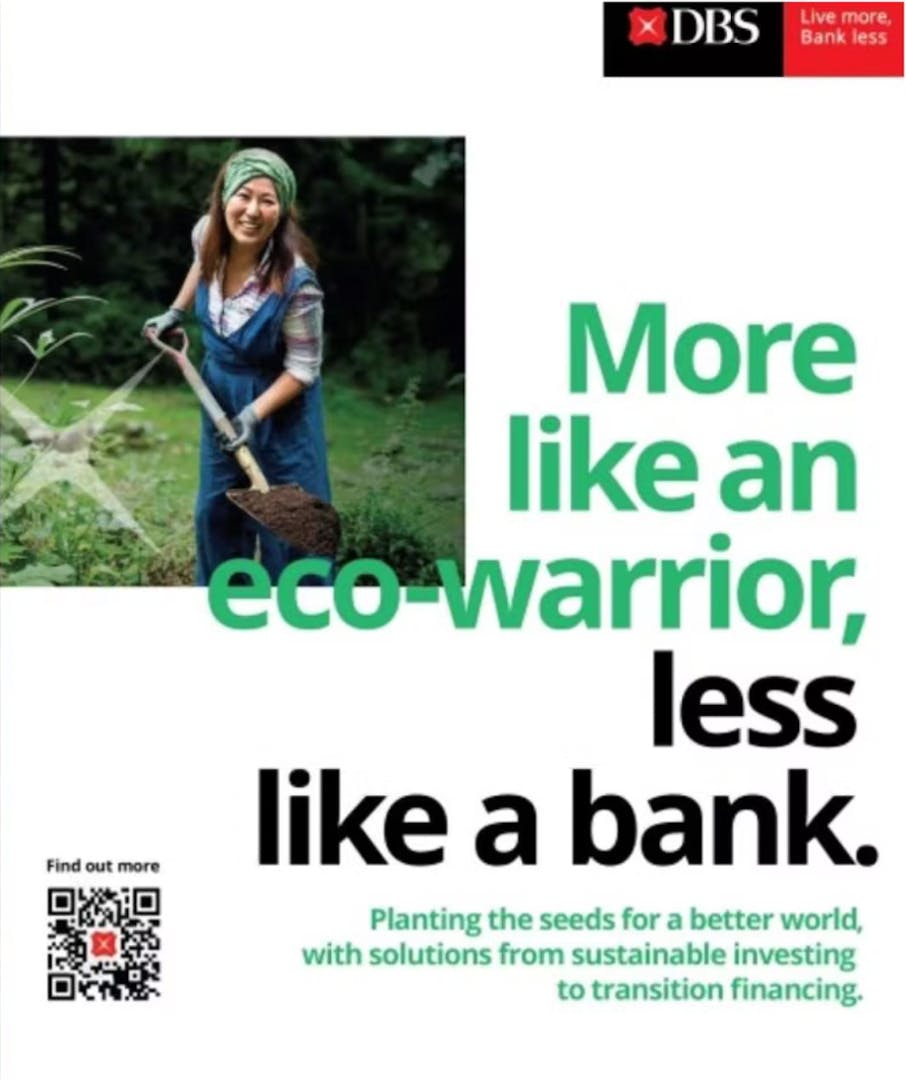
DBS’s ‘More like an eco-warrior, less like a bank’ ad slogan was used in a LinkedIn post that discussed the “moral dimension” of quitting coal. Image: DBS
The chief executive of Southeast Asia’s largest bank, Piyush Gupta, was called out for defending DBS’s decision to wait until 2039 to stop financing climate-wrecking coal power in a speech that was posted on LinkedIn in August. Gupta said it was a difficult moral decision to retreat from coal in developing countries like Indonesia where many people lack electricity. The post ended with an iteration of the bank’s advertising slogan, “More like an eco-warrior, less like a bank”. Cue outrage from impact investors and climate experts on LinkedIn, who accused the bank of trying to use energy poverty to justify climate action delay.
Though DBS is arguably Southeast Asia’s leading bank on climate action, setting interim net-zero targets in September, it has not been a good year for DBS’s marketing department. It was also called out for gender stereotyping with the ad tagline “More like your mum’s cooking, less like a bank”. Gupta had earlier been posting about about DBS’s “best-in-class” efforts at bridging the gender gap by featuring in the Bloomberg Gender-Equality Index.
Unilever: Fake plastic promises
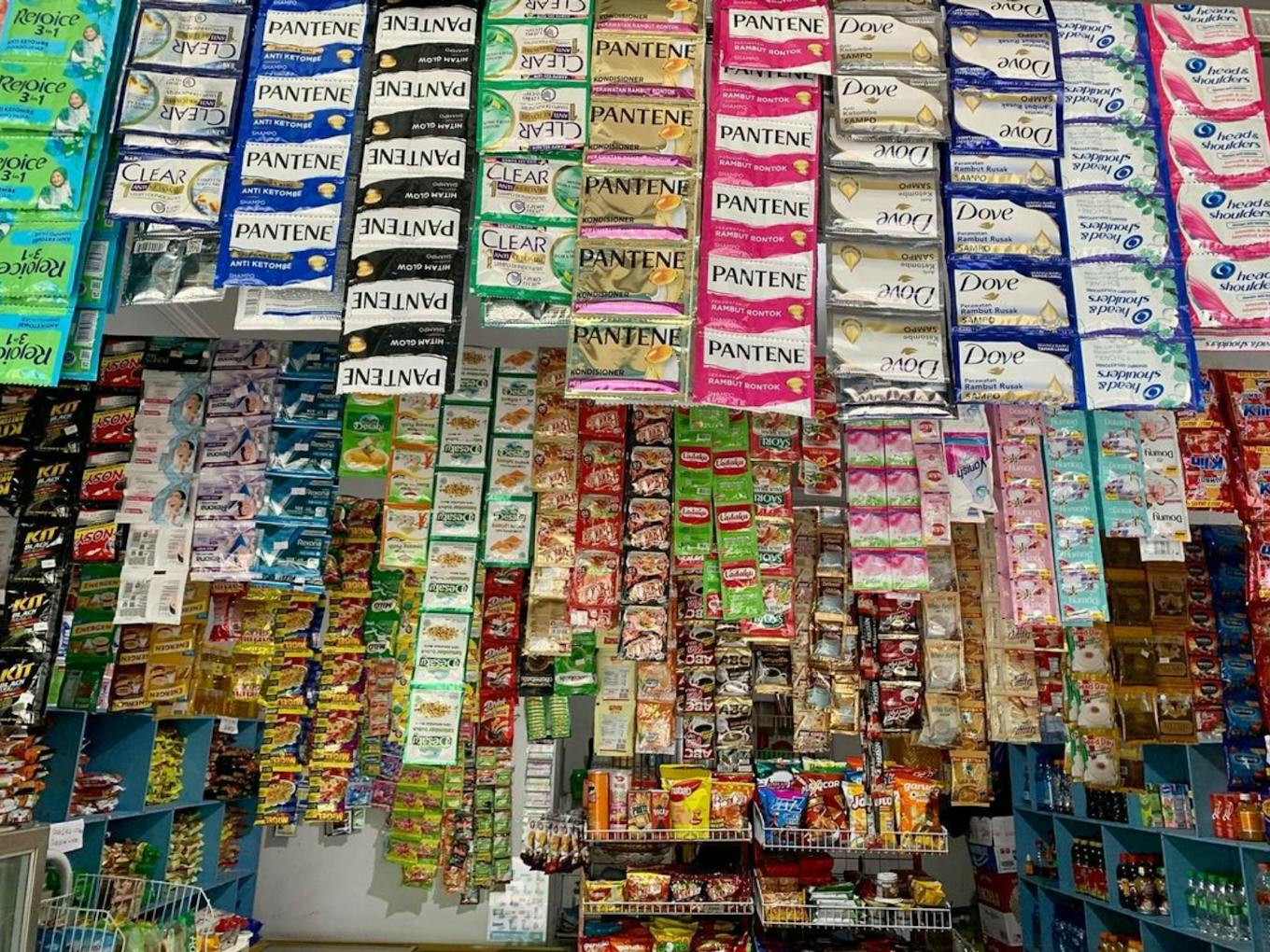
Single-use plastic sachets for sale in a store in Indonesia. Image: Robin Hicks/Eco-Business
An investigation by Reuters in June found that sustainability pin-up Unilever has been lobbying against potential bans of the single-use plastic sachets it uses to sell its products in developing countries – despite publicly promising to phase the environmentally hazardous packaging out. In a speech to investors in 2019, Hanneke Faber, Unilever’s president for global food and refreshments, had said the multilayered design of the packages is “evil because you cannot recycle it.” Unilever pioneered the introduction of plastic sachets to enable poor families in the Global South to afford its products in small quantities. The throwaway sachets have devastated waterways and marine ecosystems. Unilever set up a recycling plant for sachets in Indonesia, but the plant ran into technical difficulties and an investigation by a non-profit revealed the plant has been abandoned. Unilever has denied the closure of the plant.
Coldplay: The deforestation tour

Coldplay lead singer Chris Martin. Image: Emma Svensson/Flickr
Softrock band Coldplay felt guilty about flying around the world on “carbon-tastic” tours, so in May it announced a bunch of measures to reduce its footprint. One was a kinetic dance floor that produces electricity from the movement of excited fans. But the one that irked environmentalists the most was a partnership with Finnish oil company Neste, which claims to be the world’s largest producer of sustainable biofuels, to cut the footprint of the band’s airtravel. The company’s palm oil suppliers cut down 10,000 hectares of forest between 2019 and 2020, according to a study by Friends of the Earth.
“Neste is cynically using Coldplay to greenwash its reputation. This is a company that is linked to the kind of deforestation that would appal [Coldplay lead singer] Chris Martin and his fans. It’s not too late, they should drop their partnership with Neste now and focus on truly clean solutions instead,” Carlos Calvo Ambel, a senior director of campaign group, Transport and Environment, told The Guardian. They didn’t.
Lazada: Eco-friendly for Earth Day
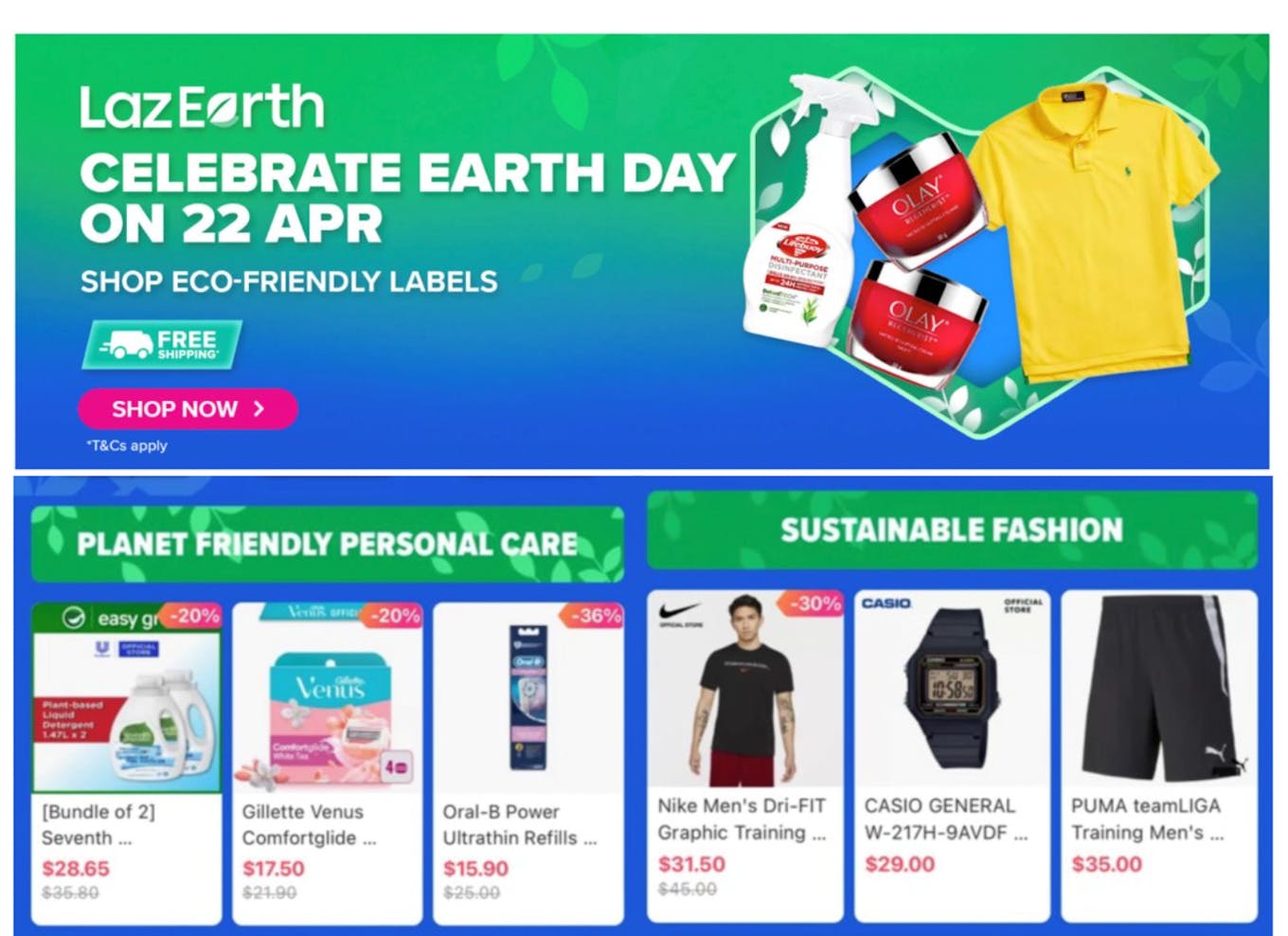
Brands labelled “planet-friendly” in an Earth Day promotion included polyester t-shirts, women’s razors and electric toothbrushes, which have been made or packaged with “reduced or better” plastic [click to enlarge]. Image: Lazada
Alibaba-owned Southeast Asian e-commerce giant Lazada launched a one-day-only campaign to promote “eco-friendly” products on its site that use less or “better” plastic for Earth Day on 22 April. Critics said that many of the products advertised as “planet-friendly” were disposable everyday products such as polyester t-shirts and women’s razors. Promoting and discounting such items does nothing to ease Southeast Asia’s plastic pollution problem, they grumbled.
Deutsche Bank: A landmark case against “green” investments?
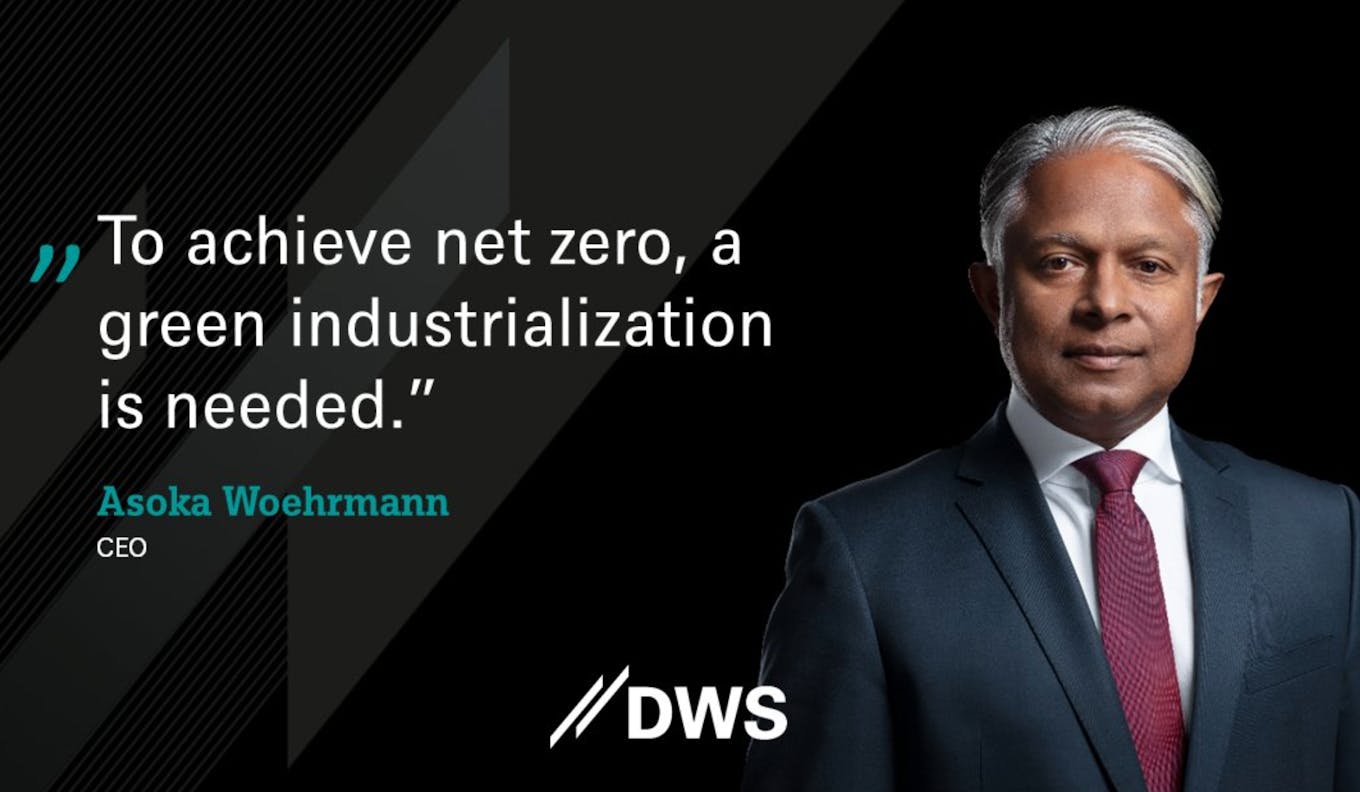
Asoka Woehrmann resigned as chief executive of DWS after a police probe into alleged misleading “green” investments. Image: DWS on Twitter
A police raid on the offices of Deutsche Bank’s investment arm DWS in Germany could go down in history as first time a major multinational business has been rapped by lawmakers for greenwashing investments. DWS was accused of falsely claiming that that more than half the company’s $900 billion assets were invested using environmental, social and governance (ESG) criteria in a 2020 annual report. DWS boss Asoka Woehrmann quit the day after the raid in June, and said criticism of the asset manager overlooked the fact it would take time to achieve its goals, and meeting sustainability targets was not a linear journey. The case is ongoing.
Japan: Cutting coal emisssions with ammonia
A plan unveiled by the Japanese government to spend ¥27.9bn (US$242 million) on subsidies for two pilot projects that aim to burn at least 50 per cent hydrogen-derived ammonia with coal at power plants by 2029 was questioned by hydrogen experts who challenged the plan for effectively reducing emissions. Ammonia combustion does not produce carbon dioxide but does emit nitrous oxide, a powerful climate agitant.
“The Japanese are clearly in deep trouble in a decarbonised future and they are desperately grasping at straws to solve their energy import problems – but ammonia? It’ll be at least five times the cost, per joule, of the energy their economic competitors use to fuel their economies,” wrote Paul Martin, co-founder of the Hydrogen Science Coalition, in a LinkedIn post. “The use of ammonia as a fuel is possible, but for stationary applications like power plants to be used more than occasionally as an emergency backup fuel, it’s highly questionable. Feeding it as a co-feed to inefficient coal plants? That’s just crazy,” he said.
Singapore Grand Prix: ‘On track’ to decarbonise with no carbon data
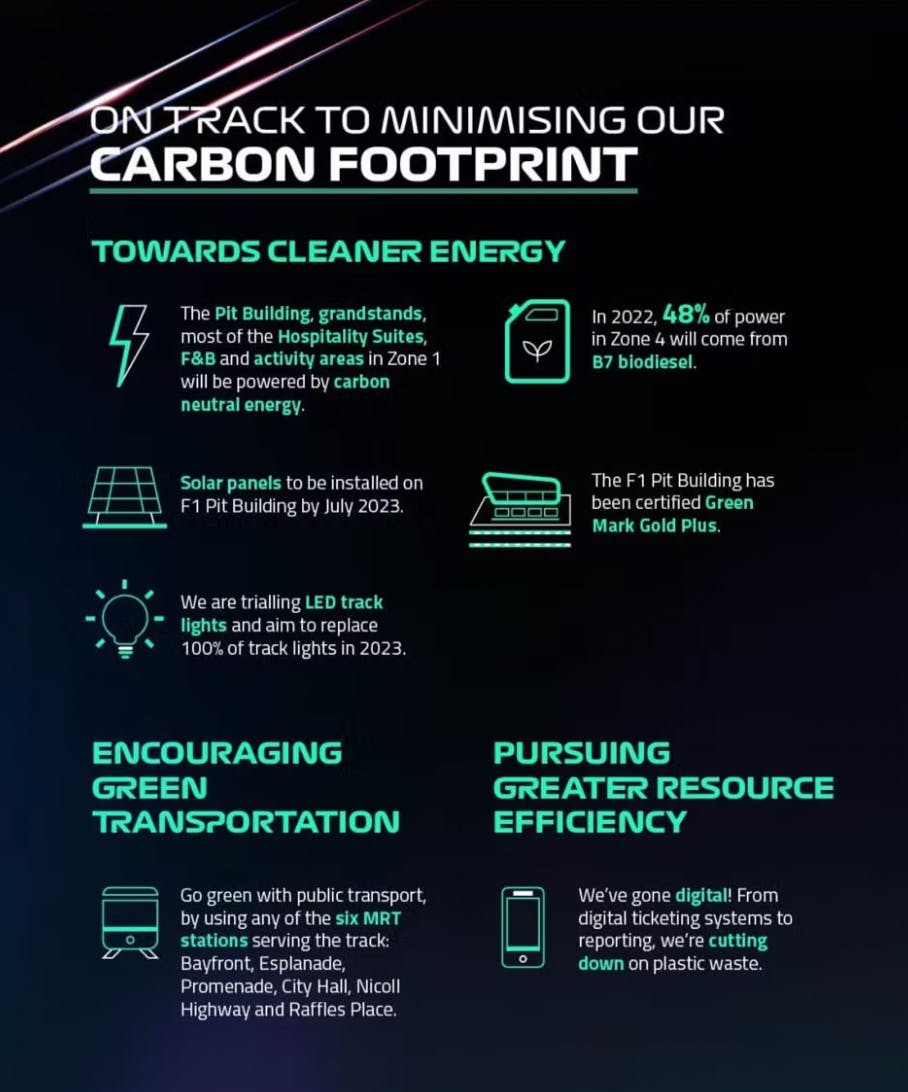
Among the green claims made by Singapore Grand Prix was that it was encouraging people to use public transport to watch the race. Image: SGP on Instagram
Green claims made by the Singapore Formula One Grand Prix were questioned for overlooking the monster carbon cost of the race. In social media posts, the event organiser’s claimed that the Singapore Grand Prix is “on track to minimising our carbon footprint” by digitising tickets, trialling LED track lights and using carbon neutral energy to power the event venue. SGP also said they are “encouraging green transportation” by informing punters which subway stations are nearest to the venue. But SGP provided no information on the actual carbon footprint of the event, which they have yet to measure.
Ho Xiang Tian, co-founder of environmental group LepakInSG, said the event’s green credentials were being promoted without acknowledgement of the wider climate impact of the race, which he said was greenwashing.
Australia: Conserving a reef while backing coral-bleaching fossil fuels
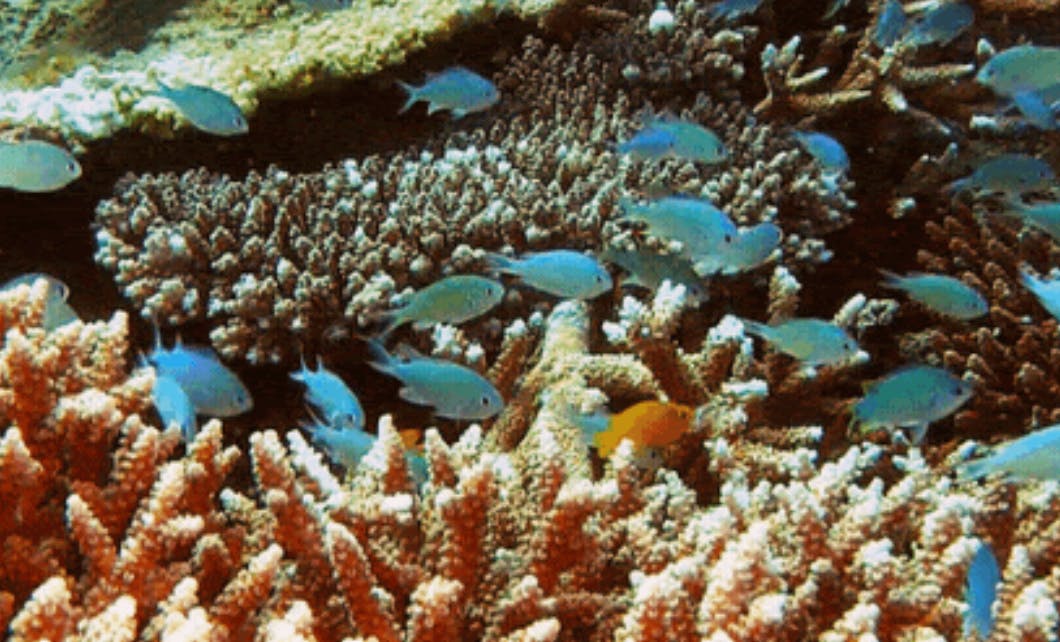
Reef washing? An Australian government plan to protect the Great Barrier Reef was called out by Greenpeace for ignoring the need to reduce reef-wrecking emissions. Image: Greenpeace
A campaign by Greenpeace said that a AU$1 billion (US$668 million) plan announced by Australia’s previous Scott Morrison-led government to conserve the Great Barrier Reef greenwashed the country’s massive investments in the fossil fuel sector. The funding “deliberately omits” a single dollar to fix the reef’s greatest threat, climate change, the group said.
“It’s hard to view this as anything other than the latest ploy to pull the wool over our eyes. Sure, the announcement might SOUND good, but it means nothing when his government continues its rampant pro-fossil fuel agenda,” said Greenpeace in a mailer appealing to its supporters to sign a petition in protest. “It might be the world’s most expensive band-aid,” it said. In recent years, the Australian government has lobbied to ensure the Great Barrier Reef was omitted from a report on UNESCO World Heritage sites threatened by climate change, Greenpeace said.
International Women’s Day hypocrisy police
In 2017, the British government made it mandatory for firms with 250 employees or more to report the difference in earnings between their male and female staff. This data was used by the Gender Pay Gap Bot, a guerilla Twitter bot, to quote-tweet companies’ loud-and-proud International Women’s Day posts with the firms’ actual gender pay gap data. The bot revealed the huge pay gap disparity that continues to exist even among gender equality champions. Some firms deleted their posts to avoid criticism, but one Twitter user collated all of the post removals, which was retweeted thousands of times.
Boohoo: Sustainability lip-service with the Kardashians

Kourtney Kardashian was appointed sustainability ambassador by fast-fashion retailer Boohoo. Image: Yahoo News
UK-based fast-fashion online retailer Boohoo hired TV celebrity Kourtney Kardashian as the brand’s sustainability ambassador for New York Fashion Week, and launched a “green” collection. This did not go down well among fashion sustainability aficionados.
“Another day, another bout of greenwashing from one of the world’s largest ultra fast-fashion brands — Boohoo,” wrote Susannah Jaffer, founder and CEO of Zerrin, a Singapore-based sustainable fashion portal, on LinkedIn. “Any sustainability campaign or collaboration by a fashion brand that is tone deaf to the reality and impact of their supply chain is greenwashing. Period.”
Zerrin pointed out that the recycled polyester and recycled cotton promoted by Boohoo as sustainable are still difficult to recycle and break down. “Not to mention that the production of this collection doesn’t do a thing to compensate for Boohoo’s output of thousands of items a month, still made from cheap, synthetic, petroleum-based materials,” she said.
“The most sustainable, eco-friendly thing that Kourtney could have done would have been to say ‘no’. But money talks,” she said.
KLM: Fly responsibly with us
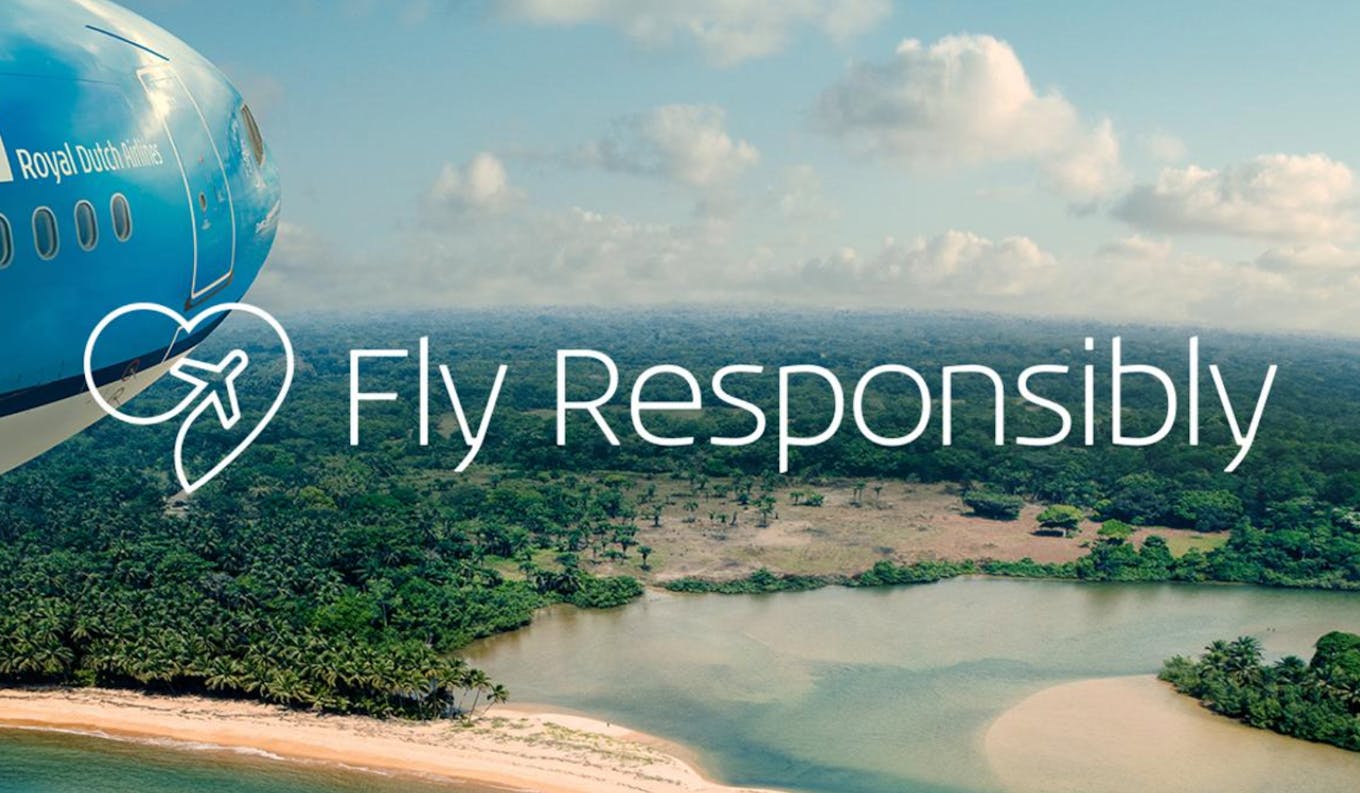
KLM’s fly responsibly campaign misleads consumers, claims activist law firm ClientEarth. Image: Fly responsibly campaign
Activist law firm ClientEarth sued Dutch airline KLM in May over an advertising campaign its says gives a false impression of the sustainability of its flights and its plans to reduce its climate impact. KLM’s “fly responsibly” campaign claimed the airline it is on course to reach net-zero emissions by 2050, and that it plans to use sustainable fuel and electric planes from 2035. But ClientEarth says KLM is breaking European consumer law by misleading consumers, as the aviation industry cannot decarbonise without scaling back the frequency of air travel. “KLM’s marketing misleads consumers into believing that its flights won’t worsen the climate emergency. But this is a myth,” said Hiske Arts, a campaigner for Fossielvrij NL, a Dutch non-profit.
WWF: Burning plastic is clean
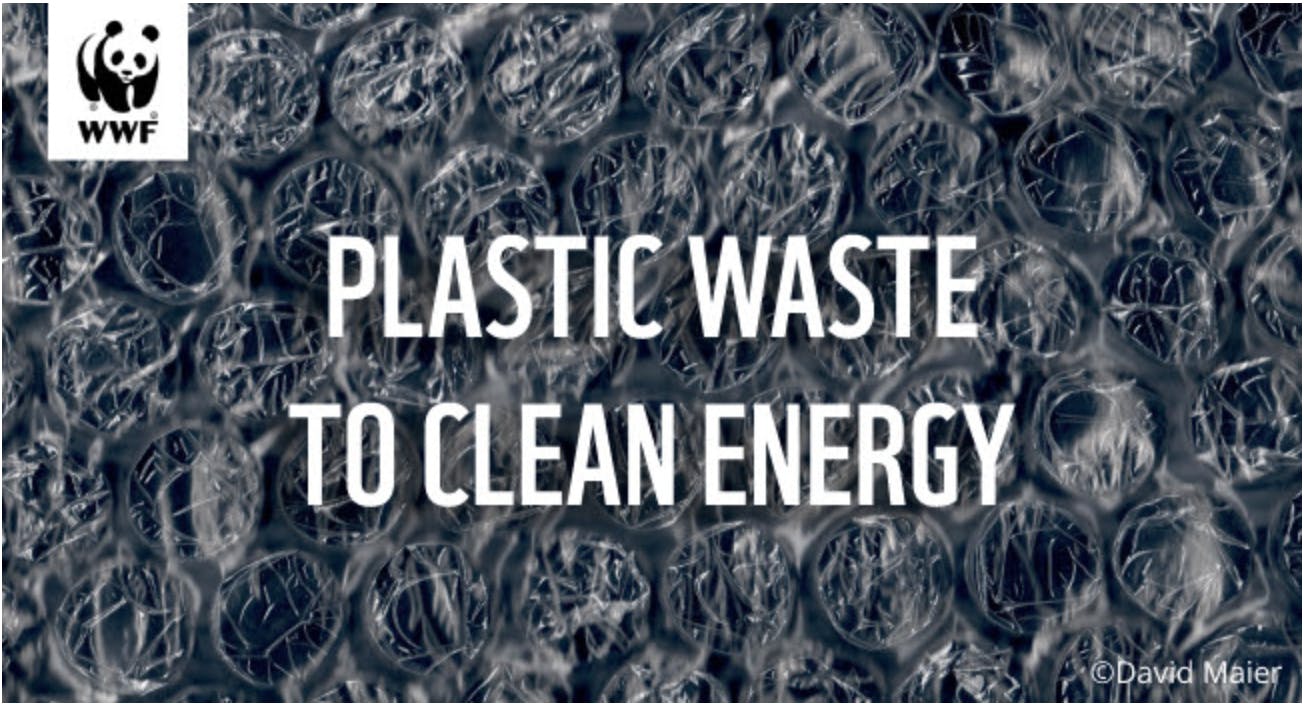
An image used in a mailer from WWF-Singapore to promote its beach clean-ups. Image: WWF-Singapore
In an email sent to its supporters in September, conservation group WWF-Singapore said that the plastic trash collected on its beach clean-ups would be sent to a local university and converted into “clean energy” after going through a process known as pyrolysis – waste is heated up and turned into pyrolytic oil. The mailer also promoted WWF’s limited edition ‘Red Panda Collection’ of tote bags, reusable drink containers and t-shirts.
Yobel Novian Putra, Indonesia-based climate and clean energy campaign officer for non-profit Global Alliance for Incinerator Alternatives, argued that there is no such thing as clean energy generated from burning a pollutive, toxic material like plastic. “Saying that energy from the pyrolysis of plastic waste is clean is the same thing as saying that the energy from waste-to-energy plants in Singapore is clean. In both cases, we are using fossil-based materials to generate energy,” he told Eco-Business.
Have we missed any? Probably. Let us know by writing to news@eco-business.com. This story is part of our Year in Review series, which journals the stories that shaped the world of sustainability in 2022.

